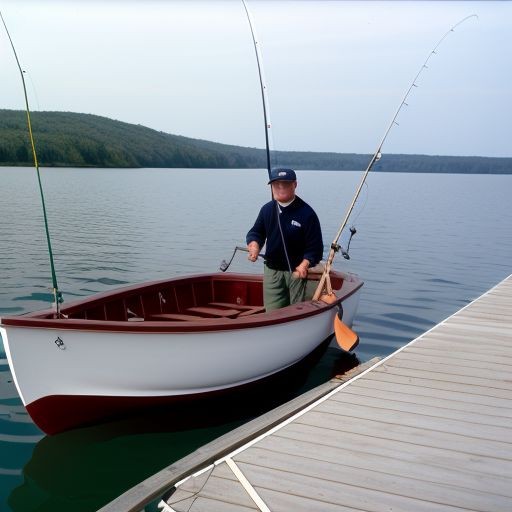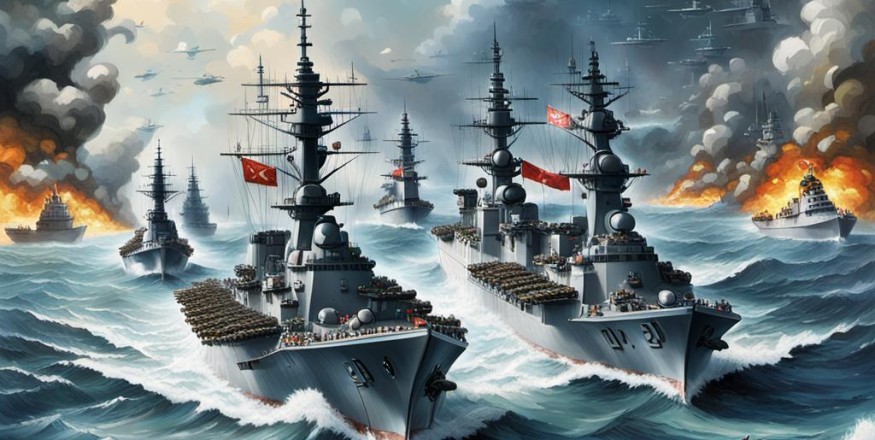 x
x
Lieutenant Holla was last seen in Fortaleza del Pueblo departing the building that housed Admiral Zhang's office. It would be the last accurate report of his whereabouts. He slipped into the night following a preplanned, circuitous route toward the waterfront. He stopped only once, to retrieve a packsack deposited earlier near the docks, changing into fisherman's attire.
Near the end of a long, dark fishing dock, he slipped into a small boat, also tied up there earlier. With a silent electric motor, he maneuvered alongside the motely, old fishing boats, avoiding any light from the shore. Then he eased along the banks of the harbor, staying within the shadows until he was well past arousing the interested of any of the sleeping sentries of the civilian Guardia. Facing open water, he switched the boat to its highest speed and aimed the craft due north.
Two hours later, with just the loom of Fortaleza del Pueblo's lights behind him, he killed the engine and drifted. Moments later he recognized the high-speed whine of the gas turbine engine coming in from the east. He knew the sound well for he had ridden that same hydrofoil one evening not so long before. It was one of the boats from Key West following the pattern of its normal patrol along the northern rim of Cuba.
Admiral Binghamton had been sure that within a week of commencement of such a patrol, the Cubans manning the coastal radar stations would become familiar with the patrol and would no longer bother to send snoopers out to track the craft. For the past week, becoming a model of consistency for the Cubans, the hydrofoil followed this exact path. This night her captain recognized the winking light he had been waiting for. Locke had banked on the constancy and the monotony of the patrol to cover this departure. Only the exact date had been uncertain.
Even before the light had been identified, the hydrofoil's radar picked up the reflector Locke had mounted on the bow of the drifting boat. Now, rather than take the chance of raising curiosity with searchlights, they charged to within a hundred yards before cutting back their speed and retracting the foils. They would be stopped for just a moment, long enough for the man in the small boat to ensure that his craft would sink as he climbed over the side into the hydrofoil.
Shortly, the American boat was once more foil-borne and racing around the western tip of Cuba, the south through the Yucatan Channel. Sixty miles into the Caribbean, she made contact with a trawler that had reached the northernmost point of her normal fishing pattern and had turned to head south. Again, there was but a brief pause, nothing longer than any Cuban snoopers would assume it would take for the hydrofoil to investigate the fisherman. Then the American naval craft turned north and raced back along the same path she had just come, following exactly the same pattern she and the Cubans had gotten used to.
It wasn't unusual in that area of the Caribbean for a fishing boat to return directly home if her hold was mostly full. Fishing had been good the previous week, and the boat stopped only twice on the return trip to put out her nets, both times as she neared her home port on the Panamanian coast. Four days passed from the time she met the hydrofoil until she was in sight of Panama.
She dawdled off Colon until after midnight. Then a man in a wet suit slipped over the side, a watertight pack attached around his back and waist. The swimmer had spent much time in the pilothouse with the captain, studying the charts, making sure of the tide and current into the harbor, memorizing the channel.
He held a device before him with a thumb button that activated an electric motor. The machine, much like a boat motor, would ease his passage into the harbor. The water was warm and clear, and he was as used to this element as the fish that surrounded him. Checking his watch and his compass with precision, he was able to follow the channel exactly as he had planned. There was little danger as long as he avoided fouling the anchor chains on merchant ships waiting above him to transit the Canal.
He checked the watch three times on his final leg, to ensure that he was still in deep enough water. When the time was right, he unscrewed the plug on the side of the motor and released it. Bubbles floating to the surface as the device filled with water and sank into the mud of the harbor.
The swimmer surfaced. Against the lights of the city of Colon, he could see that he was less than fifty yards from his landing spot. Quietly and easily, for he was rested and there was more than enough time, he swam to the appointed place. There was a ladder, just as he had expected, and he climbed cautiously until he could see to either side of the wharf. Waiting without a motion or a sound, just as he had learned so long ago, he ensured that he was alone. Then he climbed the last few rungs, slithering over the top until he was lying face down on the old wooden wharf. It reeked of fish and tar and unidentifiable smells worked into its surface over the years. They were sensations he identified with an inherent satisfaction. Sure, now that he was by himself, he slipped off the rubber swim fins and darted into a shed directly in front of him.
Just as he had anticipated, the windows were boarded over. But there was a flashlight, a change of clothes, and a briefcase waiting for him. Stripping off the wetsuit, he dropped it through the trap door in the floor, weighted with the lead weights that had also been left for that purpose. After memorizing his new credentials, he was ready to move.
Lieutenant Holla, late of Fortaleza del Pueblo, no longer existed. Harry Locke had arrived in Panama to catch up with his old friend, Newton Waverly.
Locke sincerely hoped that Waverly would be able to answer some questions for him. He had known what he was looking for when he was sent into Fortaleza del Pueblo, but he was unaware of the scope of the plan. Binghamton had never explained how big this operation had grown. There had been little time to really appreciate the details of the documents he'd scanned in Admiral Zhang's office, but he quickly comprehended the chart and its grease-pencil notations. Locke understood Binghamton's practice of limited intelligence on a need-to-know basis. But Binghamton also worked better when he knew the scope of an operation. Why the hell had Binghamton been so close-mouthed this time? In the past he'd always emphasized aspects of an operation that could affect the way a man worked. Harry Locke was sure he would have moved more quickly had he had been aware of the extent of the Chinese incursion. Hopefully Waverly would be able to expand on it. It just wasn't like Harry Binghamton to keep them in the dark this way.78Please respect copyright.PENANA0zTg0ncnj3






















